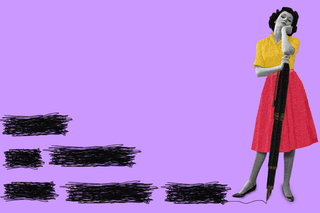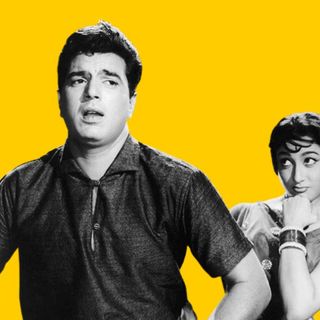
Why We Repeat Mistakes After We’ve Made Them
Research has proven that the human brain doesn’t always learn from errors.

My colleague is always late. My friend is always dating the wrong person. As for me, I seem to always procrastinate till the end of time. Things follow the same missteps, a law of motion that binds the person with the mistake in a perpetual cycle — always.
But this is all very perplexing. There has to be a point to making mistakes again and again; old chestnuts tell us we fall every now and then so we don’t err along the same lines twice. We date the wrong people so that we can learn and grow. We lose things so that we can value them more sincerely. Every social reasoning builds on a noble idea of discipline, which in theory would mean it’s terribly hard to walk on faultlines in exactly the same way. Yet, we still do it. It’s Groundhog Day over and over, in my world and others’, where people lose things and make errors uncomfortably familiar.
What is the method to the madness of errors in judgment and gaffes?
It’s less about moral expectations of wrongness and rightness, and more to do with how our brains may be wired. Olga Khazan explored this in stunning detail, pointing toward research that has proven that the human brain doesn’t always learn from errors. According to a study, the neural pathways are programmed such that every time we remember a past mistake, the brains head back down the previous pathway. The logic is when left to ponder a mistake, the brain is compelled to slow down, and dwell longer and harder on why we messed things up. Made an error at work? Made a poor relationship choice? The chances are the brain isso preoccupied with untangling the semantics of the mistake that it never quite reaches the solution part — the one that was actually integral for us to learn from.
“The reason for the reliance on worse information might be that ‘the brain gets involved in a quest to understand why the error took place,” said Roozbeh Kiani, an assistant professor at New York University’s Center for Neural Science. “The negative feedback triggers a cascade of computations, which distract from the decision at hand.”
In other words, we follow a path prone to errors precisely because of the value we ascribe to them. Mistakes are anomalies that must be dissected in mental labs; stripped down to bare bones to understand where the decision-making went awry and how to fix it. Why did I do it? Am I not competent enough? Did something about/around me change? But so strong and intensive is the process that the mistake in itself is etched in our psyche.
Related on The Swaddle:
Why We Should be Wrong More Often
Researchers have also made sense of this pattern through the idea of “target fixation” — how people become so devotedly focused on an object that their risk of colliding with it, and excluding other factors, increases to their detriment. A blog explained this as, “…if you swerve to avoid hitting a deer and are heading towards a tree, you should focus on the space next to the tree, not the tree. If you focus on the tree, you are more likely to hit it as you are turning all attention and action towards it. Similarly, if you focus on what you did wrong last time you often inadvertently end up repeating it or making a different mistake.” The idea here is perceived success too — to learn from the mistake — but the lament of fixation is such that people lose perspective.
The brain does have a fallback in place once the first mistake is committed. There is a phenomenon called “post-error slowing” wherein the brain essentially slows down the decision-making cycle when a similar issue pops up. But taking time to make decisions doesn’t necessarily mean they will be better, accurate choices devoid of errors.
There’s another reason the brain’s instinctive response is to go back to the mistake, and not apply the learning. Because in the larger scheme of things, the said mistake may not amount to a violation of disruption in what was the perceived end goal. If the consequences are minimal or scant, the neural pathway is set to the default of doing what it has always done. Take your friend who always arrives late to a lunch/dinner — despite the tardiness, they still make it to the said meal and partake in the social exchange. There’s little lost for the brain, and subsequently, the person, to radically change their ways of functioning. Conversely, for the brain to change its pathway, and reroute to a different one, is an arduous task. Change is undesirable, and thus the labor to find a new way of processing the event is deprioritized.
Arguably, repeating mistakes and reliving our individual Groundhog Days becomes a problem when it’s toxic patterns and ideologies we keep succumbing to. It’s one thing to forget the keys on your way out, another to keep running in circles of abusive relationships and cycles of debt.
Moreover, looking back at our mistakes is also discouraging and deflating to the spirit. Like misery, mistakes love company too. There is exhaustion, stress, an air of fatigue that makes it harder to pay attention to the wisdom left unwielded. In a 2016 study, Kelly Haws, an associate professor of marketing at Vanderbilt University, conducted a series of experiments on people’s impulse purchases. Some participants were asked to recall times they were able to control their temptation to buy things; others were mentally put to the task of thinking about all the times they did give in to the desire. In the next layer, Haws asked them just how much would they stretch themselves thin to buy a prized possession. Those who dwelled more on their mistaken shopping expeditions were more likely to repeat the same cycle. Haws explained: “Seeing yourself as a failure can get you down. And when we’re feeling down, we tend to splurge.”
This doesn’t mean people are doomed to relive mistakes of moments past. If to err is to human, even the ability to adapt and course correct could be human too. Imagine another setting: people keep spending money on retail therapy as a coping mechanism — a mistake if finances are thin. Instead of letting an instance go, and focusing on how one can maybe save, cut back on other avenues, or even budget in a timely way, chances are the person doesn’t repeat the same thing. Course correction holds a deeper and more pertinent allure, biologically and psychologically speaking.
The thing about history is that it has a knack for repeating. Perhaps, we look to moments of here and now, of what remains in the present. Mistakes define us, but maybe, we get better at making them.
Saumya Kalia is an Associate Editor at The Swaddle. Her journalism and writing explore issues of social justice, digital sub-cultures, media ecosystem, literature, and memory as they cut across socio-cultural periods. You can reach her at @Saumya_Kalia.
Related


Anti‑Amber Heard Campaign One of the Worst Instances of Cyberbullying: Report
